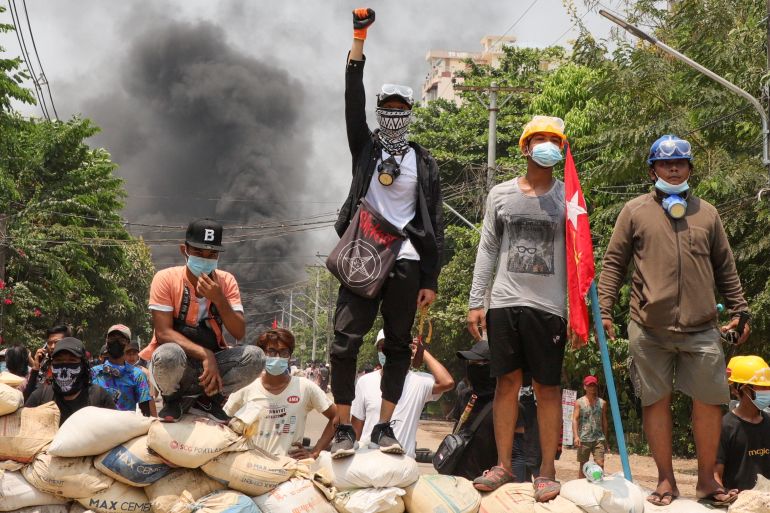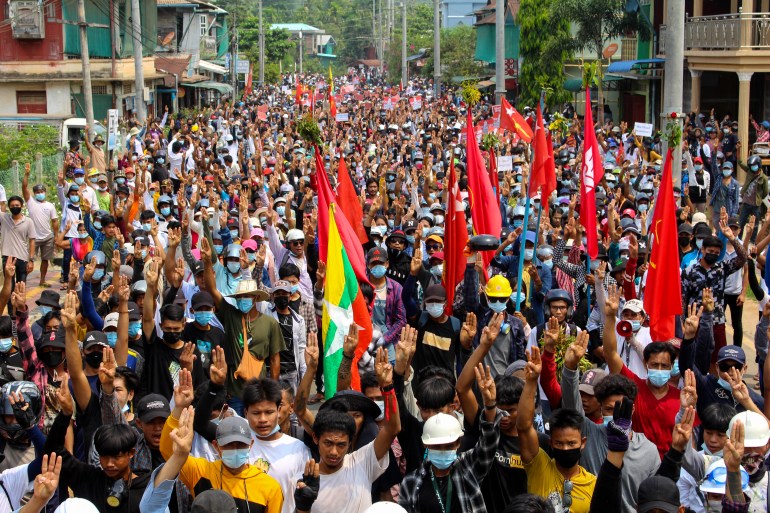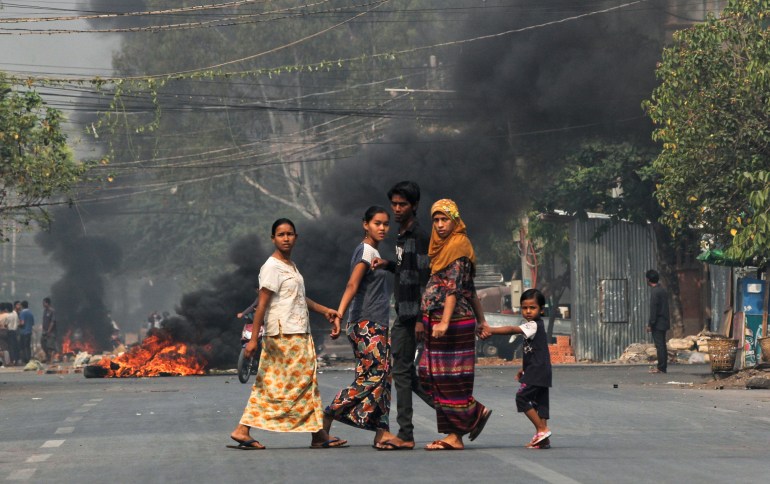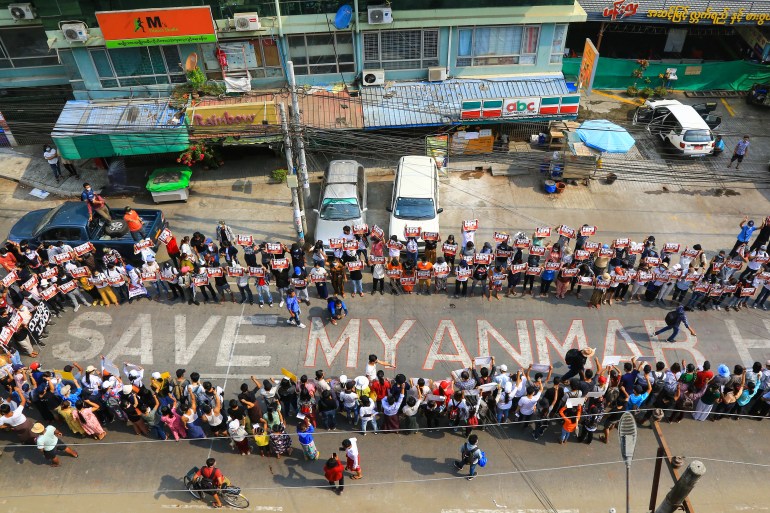‘Day of shame’: Dozens of anti-coup protesters killed in Myanmar
Dozens of people killed in bloodiest day since the Myanmar military seized power in February coup.

Dozens of people have been killed by security forces in Myanmar on Saturday, the bloodiest day of protests since last month’s coup.
The killings on the country’s annual Armed Forces Day drew renewed criticism from western countries, with the US envoy describing the violence as “horrifying”.
Keep reading
list of 3 itemsWill civil disobedience turn into armed resistance in Myanmar?
Death toll in Myanmar’s post-coup crackdown surpasses 300
Protesters against the February 1 military coup came out on the streets of Yangon, Mandalay and other towns, defying a military warning that they could be shot “in the head and back”.
The Assistance Association for Political Prisoners, a monitoring group which documents deaths and arrests, confirmed 89 people were killed by “early evening”.
Later on Saturday, the Myanmar Now news website reported that 114 people, including children, were killed across the country by security forces.
A count issued by an independent researcher in Yangon who has been compiling near-real time death tolls put the total at 107, spread over more than two dozen cities and towns, The Associated Press news agency reported.
Estimates for the previous highest daily death toll on March 14 ranged in counts from 74 to 90.
At least 40 people, including a 13-year-old girl, were killed in Mandalay, and at least 27 people were killed in Yangon, Myanmar Now said. A boy as young as five was earlier reported among the dead in Mandalay but there were conflicting reports later that he may have survived. Another 13-year-old was among the dead in the central Sagaing region
The numbers of deaths reported could not be independently verified. A military spokesman did not respond to calls from Reuters news agency seeking comment.

“Today is a day of shame for the armed forces,” Dr Sasa, a spokesman for the Committee Representing Pyidaungsu Hluttaw (CRPH), an anti-coup group set up by deposed politicians, told an online forum.
“The military generals are celebrating Armed Forces Day after they just killed more than 300 innocent civilians,” he said, giving a rough estimate of the toll since protests first erupted weeks ago.
‘New low’
The killings quickly drew international condemnation, with multiple diplomatic missions to Myanmar releasing statements that mentioned the killing of civilians on Saturday.
“This 76th Myanmar armed forces day will stay engraved as a day of terror and dishonour,” the European Union’s delegation to Myanmar said on Twitter. “The killing of unarmed civilians, including children, are indefensible acts.”
US Secretary of State Antony Blinken said Washington was “horrified by the bloodshed perpetrated by Burmese security forces, showing that the junta will sacrifice the lives of the people to serve the few”.
“I send my deepest condolences to the victims’ families. The courageous people of Burma reject the military’s reign of terror,” Blinken tweeted.
British foreign minister Dominic Raab said the violent crackdown on protests marks a new low and said Britain would work to secure a path back to democracy in the country.
“Today’s killing of unarmed civilians, including children, marks a new low. We will work with our international partners to end this senseless violence, hold those responsible to account, and secure a path back to democracy,” Raab said in a tweet.
The UN human rights high commissioner’s office said it had received reports of “scores killed”, adding that “this violence is compounding the illegitimacy of the coup and the culpability of its leaders”.

Al Jazeera’s Tony Cheng, reporting from Bangkok in neighbouring Thailand, said it was hard to determine the exact number of fatalities, but reports collated from social media suggest the nationwide death toll on Saturday was at least 50 and likely to be much higher.
“We are also seeing a lot of images of people with terrible wounds, a lot of them bullet wounds to the head – some still alive, others clearly dead – as the army has cracked down all over the country with absolute force,” he said.
Military jets also launched air strikes on a village in territory controlled by an armed group from the Karen ethnic minority and at least two people were killed, a civil society group said.
Earlier, the Karen National Union said it had overrun an army post near the Thai border, killing 10 people – including a lieutenant colonel – and losing one of its own fighters as tensions with the military surged after years of relative peace.
Military parade
Senior General Min Aung Hlaing, the junta leader, said during a parade to mark Armed Forces Day that the military would protect the people and strive for democracy.
The general reiterated a promise to hold elections, without giving any time-frame.
“The army seeks to join hands with the entire nation to safeguard democracy,” he said in a live broadcast on state television. “Violent acts that affect stability and security in order to make demands are inappropriate.”

Russia’s deputy defence minister Alexander Fomin attended the parade in Naypyitaw, having met senior junta leaders a day earlier.
“Russia is a true friend,” Min Aung Hlaing said.
Diplomats said eight countries – Russia, China, India, Pakistan, Bangladesh, Vietnam, Laos and Thailand – sent representatives, but Russia was the only one to send a minister to the parade on Armed Forces Day, which commemorates the start of the resistance to Japanese occupation in 1945.
Economy slumps amid crackdown
The country has been in turmoil since the military overthrew and detained civilian ruler Aung San Suu Kyi on February 1, triggering an enormous uprising demanding a return to democracy.
The military has defended its power grab, citing allegations of fraud in the November election which Aung San Suu Kyi’s National League for Democracy won by a landslide.
Security forces have increasingly cracked down with lethal force on demonstrations against the coup in recent weeks, using tear gas, rubber bullets and live rounds to break up rallies.
The deaths on Saturday would take the number of civilians reported killed since the coup to over 440. More than 3,000 others have been arrested.
On Friday, Yangon’s notorious Insein prison released 322 people arrested for protesting, adding to more than 600 freed earlier in the week.
The protest movement has also included widespread strikes and civil disobedience by government workers, which have hamstrung the functioning of the state.
The protests, coming on top of a COVID pandemic that has hit Myanmar hard, has struck the country’s economy.
The World Bank has warned the country faces a huge 10 percent slump in gross domestic product (GDP) in 2021.
The brutality of the crackdown has horrified international powers, which have responded with criticism and sanctions.
On Thursday the United States and United Kingdom – the nation’s former colonial ruler – put sanctions on a conglomerate owned by the Myanmar military.
Gunshots hit the US cultural centre in Yangon on Saturday, but nobody was hurt and the incident was being investigated, US embassy spokesperson Aryani Manring said.
So far, diplomatic pressure has had little effect and Washington and London hope that hitting the military’s financial interests will pay dividends.
The armed forces dominate many key sectors of the Myanmar economy, including trading, natural resources, alcohol, cigarettes and consumer goods.
The civil disobedience movement had a boost on Friday when a group of Norwegian academics nominated it for the Nobel Peace Prize – won in 1991 by Aung San Suu Kyi.